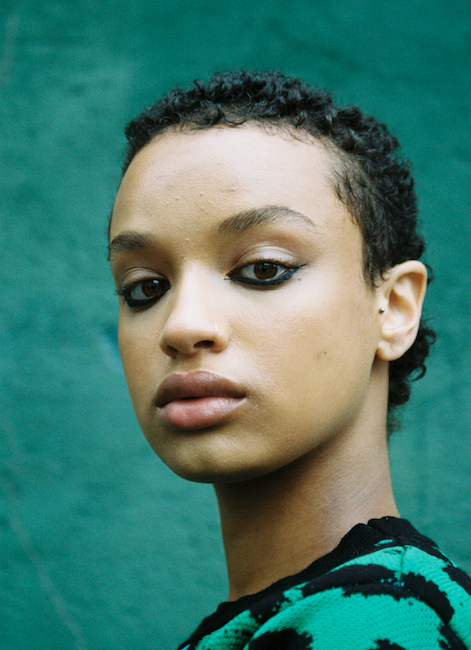The Big CHOP: A Journey To Self-Love And Empowerment
Words: Kiri Kankhwende
The world of black hair is varied and diverse, but for many, however you wear your hair – natural or relaxed, wig, weave or braids, one issue that cuts across most groups is health. And very often, the metric for assessing this is hair length.
The internet is full of products offering to make hair grow faster and longer, and many of the Youtube stars who take women through the steps of hair care include the obligatory ‘length check’.
But whereas women used to obsessively monitor their relaxed hair for split ends and negotiate trims through gritted teeth, the key word for many with natural hair now is ‘shrinkage’- often blamed for masking the true length of black hair.
But what is shrinkage if not our hair, coiled in the curl pattern which nature intended? Can we celebrate our hair at its tightest curl simply for what it is rather than rushing to pull it, stretch it to ‘prove’ how long our hair really is?
Afro hair defies gravity. I have my reservations about the concept of ‘Black Girl Magic’ because of how it is sometimes used to only validate a narrow image of instagram-ready picture-perfect blackness. But whoever it was that said: “My skin absorbs the sun’s rays and my hair defies gravity. You can’t tell me I’m not magic” was onto something.
Poet Alyestal Hamilton uses the phrase as a springboard for her poem Black Magic, about a difficult hair day that reminded her that her hair’s stubbornness to lie down is its beauty:
“I have spent hours trying to talk her [hair] down from a ledge…to get in line, to stop rebelling, to know who’s boss, to give me permission to bind her up and lock her down… but she is defiant…”
The obsession with hair length is inextricably tied up with notions of race and femininity – and black women live at the intersection of both.
In Europe, long hair has long been seen as the feminine ideal. Black women aren’t the only ones feeling the pressure; white women are also driving the hair extensions business. Shaving your head willingly (illness aside) is still seen as a radical statement; usually a sign of a woman in full rebellion, like Britney Spears or Miley Cyrus.
Black women are not immune to the pressure; after all, we all perform femininity to varying degrees. But despite the fact that there are some amazing role models for this beautiful look – like writer and actress Michaela Coel or singer Laura Mvula, it’s still perceived as a bold and radical look.
For many women, the ‘Big Chop’ is a stage on the journey out of relaxed or textured hair styles and into embracing their natural curls. Still others find embracing the big chop an empowering choice in itself. On an editorial shoot earlier this year Base founder and Editor Abisoye Odugbesan spoke to a number of models who have opted for a close cut, whether for comfort, health or the sheer joy of it:
“I wanted a change and it felt freeing to cut my hair. When I cut my hair, it took me weeks to actually go through with it, but when I did, it felt like it was how it was supposed to be. I felt more comfortable. If I did grow it back I wouldn’t straighten it again.” – Nicolette Clara
“I was relaxing and bleaching my hair all the time and I just wanted to start again and have healthy hair, so I got pair a scissors and cut it all off. It felt fresh; I felt I looked different and I liked it. I could see my face more.” – Montana
Char said: “I wanted to do something that allowed me to accept myself for myself and I felt that shaving my hair would do that because you’re stripped back, there’s nothing else but my face. So then I had to learn to like my face… living in Leicester, it’s not really a thing so it wasn’t until I moved to London and I saw other girls with shaved hear that I decided to do it . Finally, I can go on holiday and not have to worry about my hair, I can shower and not worry about my hair; it was like liberation. I don’t think I would have had the confidence to start modelling if I hadn’t shaved my hair.”
This year’s record-breaking Marvel film, Black Panther, featured the Dora Milaje, an all-female elite guard for the king who, apart from being strong, courageous and skilled warriors, have shaved heads.
In one of the film’s funnier moments, their general Okoye, played by Danai Gurira, has to wear a wig to go undercover and declares that she feels ‘ridiculous’. Having hair has no effect on her femininity – if anything, it’s an inconvenience.
Forget Wonder Woman, which has been hailed as the first feminist Marvel film. Watching Okoye flirt with her lover – and later fight him – I was struck by how the Dora Milaje do not pander to the male gaze with the usual sexy attire and long hair so often seen in comic book heroines.
There is an African element to the style too; bald heads on women are hardly unusual in South Africa, which had a heavy influence on the film’s language and visual aesthetic.
Malika, a model, told Base: “I’d always had long hair and just wanted to experience a change. Back home it’s acceptable for girls to have short hair but here (UK) a lot of women treasure the hair. My mum’s first reaction wasn’t great. I get a lot compliments but people sometimes think I’m a boy which does make me feel insecure but to me it’s just hair; it doesn’t define anything.”
Even if your hair is natural, the pressure to adhere to a lighter, whiter ideal, still lingers. Natural hair beauty brands such as Shea Moisture have faced criticism in the past for erasing women with coarser hair textures in favour of a wavier, looser curl more often seen on women of mixed heritage.
A few years ago, Dominican poet Elizabeth Acevedo’s poem Hair, in which she recounts being told to “fix” hers because curls are associated with prostitutes in her country, went viral. She spoke powerfully about the historic desire to escape proximity to blackness and erase African heritage “out of our skin, iron them out of our hair.”
She concludes: “Momma tells me to fix my hair, and so many words remain unspoken. Because all I can reply is, ‘You can’t fix what was never broken.”

